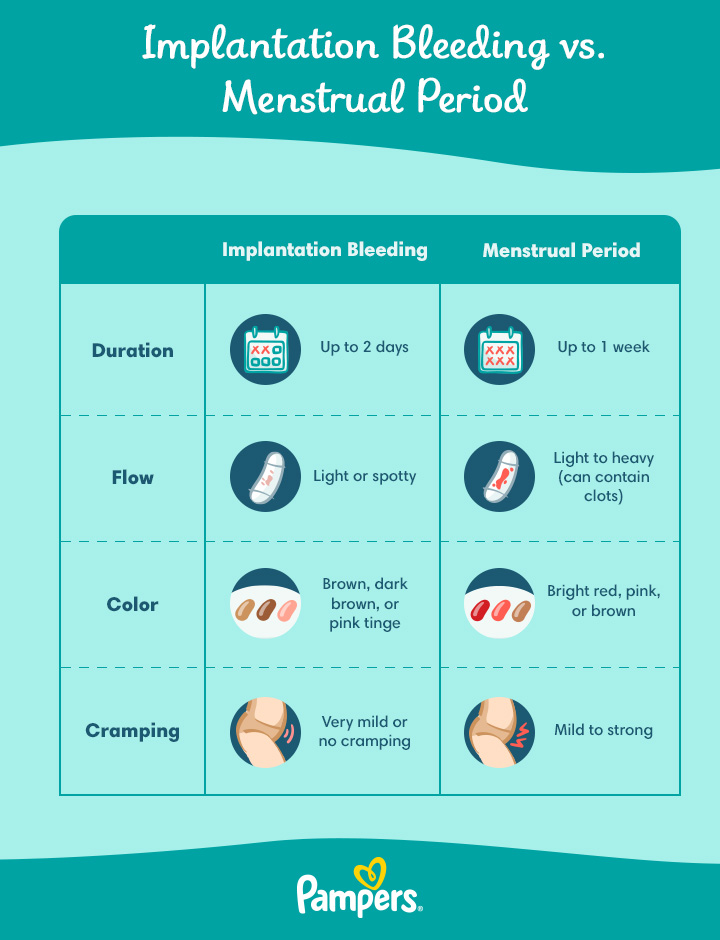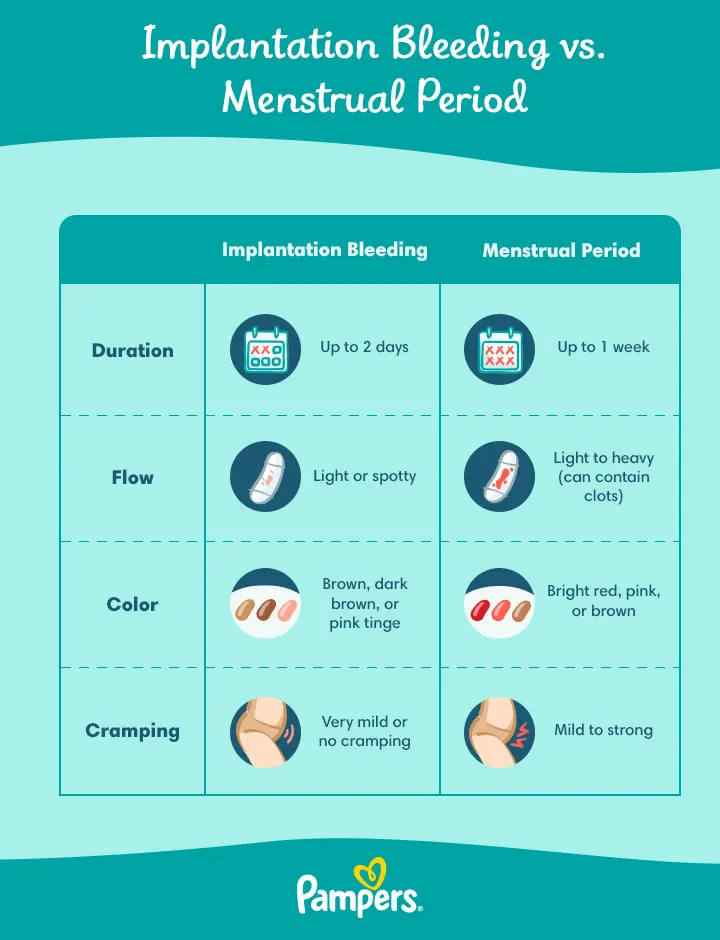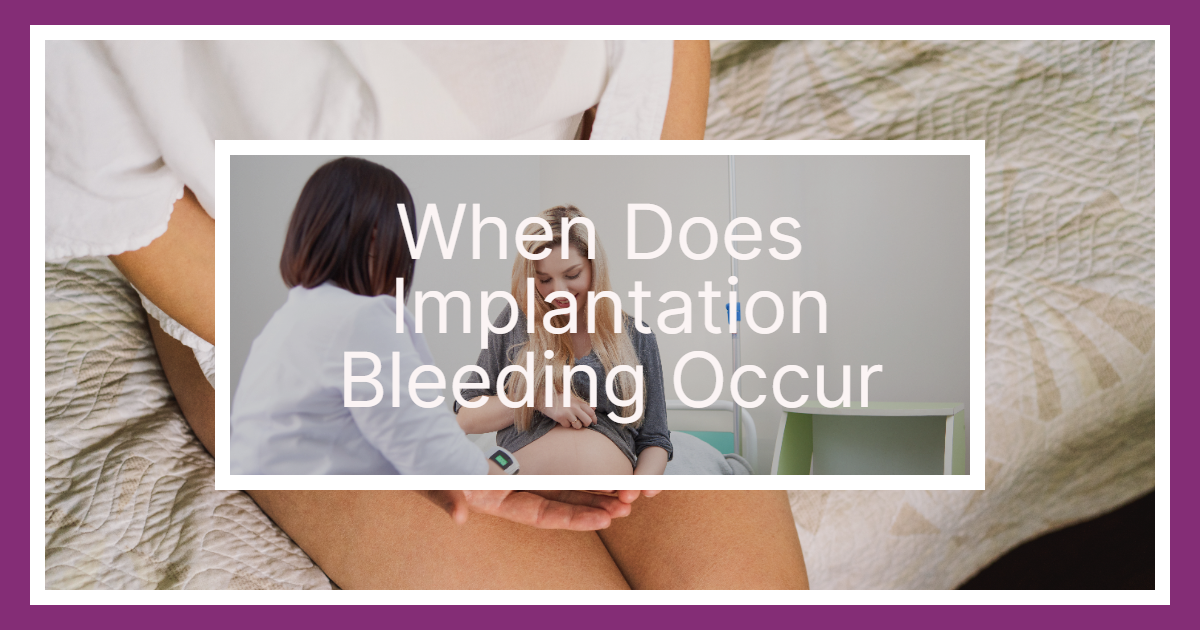When Does Implantation Bleeding Occur? Implantation bleeding typically occurs 6 to 12 days after conception. It is a light spotting that may last for a few days.
Implantation bleeding is one of the earliest signs of pregnancy. It happens when the fertilized egg attaches to the lining of the uterus. This event often coincides with the time of an expected period, leading to confusion for many women.
The bleeding is usually lighter than a regular period and may appear as pink or brown discharge. Recognizing implantation bleeding can help in early pregnancy detection. Spotting this symptom, along with others like mild cramping or breast tenderness, can prompt a pregnancy test. Understanding this phenomenon is crucial for those trying to conceive.
Introduction To Implantation Bleeding
Implantation bleeding occurs when a fertilized egg attaches to the uterus lining. This event usually happens around 6-12 days after conception. Many women might mistake it for a light period. Understanding the timing and signs of implantation bleeding is crucial for those trying to conceive.
Common Misconceptions
- Many believe implantation bleeding is heavy. It is usually very light.
- Some think it lasts as long as a period. It typically lasts only a day or two.
- There is a myth that implantation bleeding occurs exactly on the day of a missed period. It often occurs earlier.
Importance Of Accurate Timing
Knowing the exact timing of implantation bleeding helps in determining pregnancy. This knowledge can reduce anxiety and confusion. Tracking this event is especially important for women undergoing fertility treatments. Accurate timing can also help in distinguishing between implantation bleeding and an early period.
| Aspect | Implantation Bleeding | Menstrual Period |
|---|---|---|
| Timing | 6-12 days post-conception | 14 days post-ovulation |
| Flow | Light spotting | Heavy flow |
| Duration | 1-2 days | 3-7 days |
| Color | Light pink or brown | Bright red |
The Basics Of Implantation
Implantation is a crucial step in early pregnancy. It occurs when a fertilized egg attaches to the uterus wall. This process can cause light bleeding, known as implantation bleeding.
What Is Implantation?
Implantation is when a fertilized egg, or blastocyst, attaches to the lining of the uterus. This usually happens 6 to 10 days after ovulation. The fertilized egg travels down the fallopian tube. It then implants itself into the uterine lining. This marks the beginning of pregnancy.
Role In Pregnancy
Implantation plays a vital role in pregnancy. Without it, a pregnancy cannot proceed. The uterine lining provides nutrients to the growing embryo. This helps in the development of the fetus. Implantation is the first step in this nurturing process.
| Stage | Timeline | Details |
|---|---|---|
| Fertilization | Day 0 | Egg and sperm meet in the fallopian tube. |
| Blastocyst Formation | Days 1-5 | Fertilized egg divides and forms a blastocyst. |
| Implantation | Days 6-10 | Blastocyst attaches to the uterine lining. |
Signs of implantation can include light spotting or cramping. This is normal and usually not a cause for concern.
- Light Spotting: This is lighter than a regular period.
- Mild Cramping: Similar to menstrual cramps but milder.
Understanding implantation helps you recognize early signs of pregnancy. It is a natural and essential part of the pregnancy process.
Timing Of Implantation Bleeding
Implantation bleeding is an early sign of pregnancy. It happens when the fertilized egg attaches to the uterine wall. Understanding its timing can help you recognize early pregnancy symptoms.
Typical Timelines
Implantation bleeding usually occurs 6 to 12 days after conception. Most women notice it around 7 to 10 days after ovulation. The bleeding is light, spotting, or a few drops of blood.
It often happens before your expected period. This can make it hard to distinguish from menstrual bleeding. Implantation bleeding lasts for a short time, usually 1 to 3 days.
Factors Affecting Timing
| Factor | Effect on Timing |
|---|---|
| Ovulation Timing | Early or late ovulation can change implantation timing. |
| Egg Travel Time | Longer travel time delays implantation. |
| Uterine Health | Healthier uterus may speed up implantation. |
| Hormonal Balance | Balanced hormones support timely implantation. |
These factors can make implantation bleeding vary among women. If you notice unusual bleeding, consult your healthcare provider.
:max_bytes(150000):strip_icc()/implantation-bleeding-5114764_FINAL-a97f6f432f72496bad445633ac619fec.jpg)
Credit: www.verywellhealth.com
Identifying Implantation Bleeding
Implantation bleeding is a key early pregnancy sign. It occurs when the fertilized egg attaches to the uterine lining. Recognizing it helps in early pregnancy detection. This guide will help you identify and differentiate implantation bleeding from menstrual bleeding.
Characteristics
Implantation bleeding is light and usually pink or brown. It occurs 6 to 12 days after conception. The flow is very light compared to a period. It often lasts only a few hours to two days.
Implantation bleeding does not include clots. The bleeding is often accompanied by mild cramping. Some women might not experience it at all.
Differentiating From Menstrual Bleeding
| Characteristic | Implantation Bleeding | Menstrual Bleeding |
|---|---|---|
| Color | Pink or Brown | Bright Red |
| Flow | Very Light | Heavy to Moderate |
| Duration | Few hours to 2 days | 3 to 7 days |
| Cramping | Mild | Moderate to Severe |
| Timing | 6-12 days post-conception | Every 28-32 days |
- Implantation bleeding typically happens before your expected period.
- Menstrual bleeding follows a regular cycle and is heavier.
Understanding these differences helps in identifying early pregnancy. Always consult a healthcare provider for accurate diagnosis.
Factors Influencing Implantation Timing
Understanding the factors influencing implantation timing is crucial for those tracking their fertility. Several elements play a role in when and how implantation bleeding occurs. These factors can be divided into two main categories: biological factors and external factors.
Biological Factors
Biological factors include the natural processes and conditions within the body that affect implantation timing. These factors vary from person to person, making each experience unique.
- Hormonal balance: Hormones like estrogen and progesterone must be balanced for successful implantation.
- Ovulation timing: The timing of ovulation affects when an egg is available for fertilization.
- Uterine lining: A thick and healthy uterine lining is essential for the embryo to attach.
- Age: Age can influence fertility and implantation success.
- Genetics: Genetic factors can impact implantation timing and overall fertility.
External Factors
External factors encompass lifestyle choices and environmental influences that can affect implantation timing. Being aware of these factors can help manage expectations and improve fertility outcomes.
- Stress: High stress levels can disrupt hormonal balance and delay implantation.
- Nutrition: A balanced diet rich in vitamins and minerals supports reproductive health.
- Exercise: Moderate exercise can enhance fertility, but excessive exercise may be detrimental.
- Substance use: Smoking, alcohol, and drugs can negatively impact implantation.
- Medications: Certain medications can interfere with hormonal balance and implantation.

Credit: www.pampers.com
Implications Of Implantation Timing
Implantation timing plays a crucial role in early pregnancy. Understanding this timing can help expectant mothers make informed decisions. It also aids in recognizing early pregnancy symptoms.
For Pregnancy Testing
Knowing when implantation bleeding occurs can help in determining the best time for a pregnancy test. Implantation typically happens 6-12 days after ovulation. This is usually a few days before your next period is due.
It’s important to wait at least a few days after implantation to take a pregnancy test. This allows enough time for the pregnancy hormone (hCG) to build up in your system. Testing too early might give a false negative result.
Many home pregnancy tests are sensitive to hCG levels. They can detect pregnancy as early as the first day of a missed period. For the most accurate result, wait until a week after your missed period.
For Early Pregnancy Care
Understanding the timing of implantation can help you start early pregnancy care effectively. This includes taking prenatal vitamins and avoiding harmful substances.
Early pregnancy care also involves scheduling your first prenatal visit. This visit usually happens around 8-10 weeks of pregnancy. Your healthcare provider will confirm your pregnancy and discuss your health history.
They will also provide important advice on nutrition, exercise, and lifestyle changes. Starting care early ensures the best outcomes for both mother and baby.
Recognizing implantation bleeding can also help you stay calm. Implantation bleeding is usually light and short, lasting a few hours to a couple of days. This is different from menstrual bleeding, which is heavier and lasts longer.
Keep track of any symptoms and changes in your body. This information can be helpful during your prenatal visits.
Myths Vs. Facts
Understanding implantation bleeding can be confusing. Many myths and facts surround this topic. Let’s clear the air by addressing common myths and presenting scientifically proven facts.
Addressing Common Myths
- Myth: Implantation bleeding is always heavy.
- Fact: Implantation bleeding is usually light and spotting.
- Myth: Implantation bleeding lasts for many days.
- Fact: It typically lasts 1 to 2 days.
- Myth: Implantation bleeding is bright red.
- Fact: It is often pink or brown.
Scientifically Proven Facts
- Implantation bleeding occurs 6 to 12 days after conception.
- The bleeding is not as heavy as a regular period.
- It happens when the fertilized egg attaches to the uterine lining.
Here is a simple table to differentiate between Implantation Bleeding and Menstrual Period:
| Implantation Bleeding | Menstrual Period |
|---|---|
| Light spotting | Heavy flow |
| Lasts 1-2 days | Lasts 3-7 days |
| Pink or brown color | Bright red color |
Recognizing implantation bleeding helps in identifying early pregnancy. It’s important to know the facts and avoid myths. This understanding can reduce anxiety and confusion.

Credit: www.pampers.com
Frequently Asked Questions of When Does Implantation Bleeding Occur
How Do I Know If It’s Implantation Bleeding?
Implantation bleeding is light spotting, usually pink or brown, occurring 6-12 days after ovulation. It lasts 1-2 days.
At What Period Does Implantation Bleeding Occur?
Implantation bleeding occurs 6 to 12 days after conception. It often coincides with the expected period. This light spotting is a common early pregnancy symptom.
Will A Pregnancy Test Be Positive During Implantation Bleeding?
A pregnancy test can be positive during implantation bleeding, but it’s best to wait a few days for accuracy.
What Week Of Pregnancy Is Implantation?
Implantation typically occurs around week 3 of pregnancy. It happens about 6-10 days after ovulation.
What Is Implantation Bleeding?
Implantation bleeding is light spotting when a fertilized egg attaches to the uterus.
When Does Implantation Bleeding Start?
It typically starts 6-12 days after conception.
How Long Does Implantation Bleeding Last?
Implantation bleeding usually lasts a few hours to three days.
What Color Is Implantation Bleeding?
It is usually light pink or brown in color.
How Heavy Is Implantation Bleeding?
Implantation bleeding is typically much lighter than a menstrual period.
Can Implantation Bleeding Be Mistaken For A Period?
Yes, it is often mistaken for a light period due to its timing and appearance.
Conclusion of When Does Implantation Bleeding Occur
Implantation bleeding typically occurs 6-12 days after conception. It’s a normal and early sign of pregnancy. Understanding this helps reduce anxiety. Track your cycle and symptoms for better awareness. If unsure, consult a healthcare professional. Stay informed for a healthy pregnancy journey.
Visit our other website to see/buy/read more about women best products.




